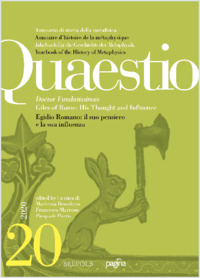Aristotle Theologized: the Importance of Giles of Rome’s Sententia de bona fortuna to Late Medieval and Renaissance Peripatetism
BHAP-PH
- Cordonier, Valérie CNRS, UMR7219, Paris / Université de Fribourg, Suisse
- 2020
Published in:
- Marienza Benedetto, Francesco Marrone, Pasquale Porro (ed.), Doctor Fundatissimus. Giles of Rome: His Thought and Influence. - Turnhout, Brepols, 2020. - 2020, vol. Quaestio: The Yearbook of the History of Metaphysics, 20 (2020), p. 137-157
Philosophy
Theology
Anthropology
Medieval Aristotelian tradition
Late scolasticism
Ethics
Good fortune
Humanism
Natural Theology
"nature" (different meanings of-)
Divine government
Liber de bona fortuna
Thomas Aquinas
Aristoeles Latinus
Aegidius Romanus
Giles of Rome
Sententia de bona fortuna
Aristotle's Nicomachean Ethics
Aristotle's Metaphysics Lambda
God's actions toward the creatures
Doctrine of fortune
Determinism
Aristotelician theology
Radicalisation of some theological views
Liber de bona fortuna
Aristoeles Latinus
Aegidius Romanus
Sententia de bona fortuna
Philosophie
Théologie
Anthropologie
Tradition aristotélicienne au Moyen âge
Scolastique tardive
Gouvernement divin
Éthique
Bonne fortune
Humanisme
Théologie naturelle
"Nature" (différents sens de-)
Thomas d'Aquin
Aristote latin
Gilles de Rome
Éthique à Nicomaque d'Aristote
Métaphysique Lambda d'Aristote
Actions de Dieu envers les créatures
Doctrine de la fortune
Déterminisme
Théologie aristotélicienne
Radicalisation de certaines conceptions théologiques
English
When studying the scholastic Aristotelian tradition in the Late Middle Ages or in Early Modernity, the modern scholar realizes that in these periods, Aristotle is sometimes something else, or something more than what he means to modern readers. This paper highlights the decisive role played in the longer course of Aristotelian tradition by Giles of Rome’ Sententia de bona fortuna, a work that constitutes a telling example of the radical transformations imposed by Latin thinkers on the Aristotelian philosophical system. The impact of this commentary was decisive for the subsequent discussions on fortune, contingency and “divine government” – that is, the issue of how God, as the First Principle of all beings, leads them all to their ends or their ultimate “good”. In so doing, the article shows that Giles’ reading of the (Pseudo-)Aristotelian treatise called Liber de bona fortuna marked the birth of a coherent ‘natural theology’ in the Latin West.
- Faculty
- Faculté des lettres et des sciences humaines
- Department
- Département de Philosophie
- Language
-
- English
- Classification
- Philosophy, psychology
- License
-
License undefined
- Open access status
- green
- Persistent URL
- https://folia.unifr.ch/unifr/documents/325606
Statistics
Document views: 131
File downloads:
- 2020cordonieraristotletheologized: 329
